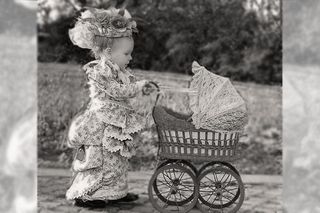
Why Your Kids Are Well‑Behaved in Front of Everyone Else
Kids give a damn about their bad reputation.

“She’s so sweet and well-behaved! Is she always like this?”
So goes the teeth-gritting refrain every parent has heard at some point. Because no — no she is not. When she’s at home with you, she bounces off the walls. And experts have a new explanation for why: Kids start caring about their public image as early as age 5.
“Psychologists have been long interested in how we construct our identities and the sorts of strategies that we use to present ourselves in society,” says literature review author Alex Shaw, a developmental psychologist at the University of Chicago. “We’re finding that the kinds of complex and strategic self-presentation behaviour we see in adults appear at a much younger age than previously known.”
Age 5 does indeed seem early. But given that by this age kids start developing Theory of Mind (that is, the ability to understand other people see the world, including yourself, differently), which seems like a prerequisite for reputation management, it’s not wholly shocking. And yet, age 5 is still four years earlier than the age at which experts had previously believed kids start caring about reputation.
Shaw, with Ike Silver, a doctoral student at the Wharton School of Business at the University of Pennsylvania, examined studies of kids from many cultures to determine when they develop a sense of self-image. In one such study, researchers told preschoolers they had a good reputation among their peers. When the same preschoolers later had an opportunity to cheat, they were less likely to cheat than their classmates, who had not been primed to consider their reputation.
Comparing this finding, and the findings of many related studies, Shaw and Silver conclude that kids learn what a social image is and that it’s important by observing adults around them, rather than through imbibing social norms and expectations, and at an earlier age than most would expect.
“As a society, we’re heavily focused on image construction and self-presentation, and our children get early, condensed exposure to the idea of image and social status,” Silver says. “Children are sensitive to how those around them behave, including adults who highly value their reputations.”
Just like adults, the authors write, kids also want to feel accepted and appreciated by people they admire. When put into interactive situations such as toy sharing, working in a team, and listening to a teacher, kids test out ways to build a positive social reputation, and strategically change the way they behave in order to enhance their social image as well-behaved or morally good among peers as well as adults.
However, it’s unclear how fully developed kids’ reputation awareness is at this age. Adults juggle numerous personality traits, emphasizing some and minimizing others in front different audiences, depending on what those audiences value (for instance, playing up trustworthiness in front of a boss, or dutifulness in front of in-laws). Experts aren’t sure whether kids can do the same, and Shaw and Silver say more research is needed to understand both the developmental precursor to understanding reputation and the successful strategies kids use to manage it.
“Moving forward, a question we’re thinking about is, ‘What happens even earlier than age five?’ We don’t believe children show up to the first day of kindergarten and have the idea of reputation suddenly pop into existence,” Silver says. “As we start to understand that reputational strategies emerge before the age of 9 as was previously believed, the next logical question is, ‘What happens even earlier?'”
Angelina Shah is a staff writer with The Swaddle. In her previous life she was a copywriter in advertising. She has a penchant for reading, singing, travelling and being obsessed with superheroes.
Related


How the Infant Microbiome Shapes Kids’ Long‑Term Health
